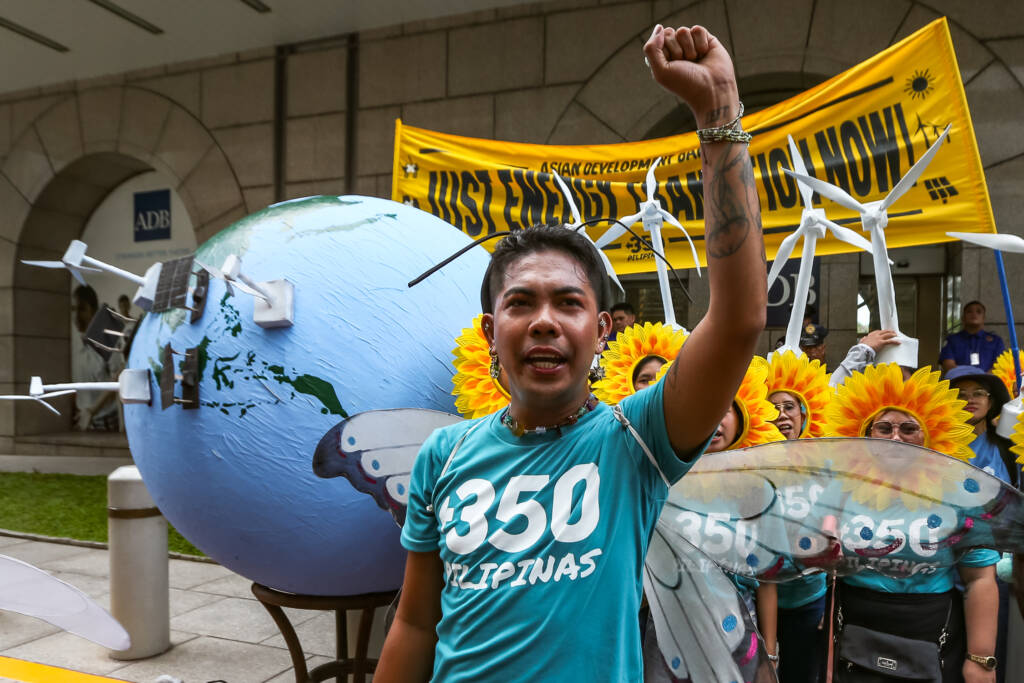The money for a cooler, fairer world exists—it’s just in the wrong hands
Chuck Baclagon | 350.org Asia Regional Finance Campaigner

On World Environment Day, climate justice and clean energy advocates led by 350 Pilipinas held a creative action in front of the Asian Development Bank (ADB) building in Mandaluyong City, Philippines. Calling out the bank’s continued support for fossil fuels, they urged the region’s top energy funder to choose real, community-driven climate solutions. Photo: Leo M. Sabangan II
Many global leaders have anchored critical decisions affecting the people and the planet on a dangerous fiction of scarcity. If they are to be believed, there’s always isn’t enough money to go around: not enough for public services, not enough for jobs or higher wages—and certainly not enough for addressing climate change.
But while rich governments slash aid and claim empty coffers, they fund wars and fossil fuel expansion. The wealth of billionaires and fossil fuel giants grows in direct proportion to global carbon emissions that are wiring us for destruction.
Nowhere is this more evident than in Asia. The region, which houses more than half the world’s population, is heating up nearly twice as fast as the rest of the world, according to a recent UN report.
Prolonged heatwaves in East and South Asia. Shrinking glaciers of the Himalayas. Marine heatwaves in nearly 15 million square kilometers of ocean—an area larger than Russia. From floods and landslides that kill hundreds in Nepal and India, to drought and food insecurity affecting billions throughout the region, the human and ecological toll of Asia’s climate crisis is mounting.
Most Asians bearing the brunt of the climate crisis didn’t create it. Yet the wealthy nations who built their prosperity on fossil fuels are claiming they aren’t financially responsible either. They demand that climate-vulnerable nations pay for their own climate solutions, mostly through loans from International Financial Institutions (IFIs) that trap them in exploitative debt cycles.
The 4th UN Conference on Financing for Development (FfD), taking place in Seville, Spain, represents a chance for reparative action at the crossroads of economic justice and climate action. The FfD aims to align financial flows—from domestic taxation to global public and private finance—with sustainable development priorities.
For Asia, it’s a crucial opportunity to direct resources toward low-carbon, equitable pathways. Yet to fulfil its promise, FfD must first address the power imbalances and structural inequities that have long skewed development finance in favor of the wealthy and the polluting.
The path forward requires confronting two fundamental truths. First, there is more than enough wealth to address the climate crisis, end energy poverty, and build thriving, just societies. Global wealth inequality has reached staggering proportions, with the richest 1 percent bagging twice as much wealth as the bottom 99 percent. Meanwhile, fossil fuel companies—the primary architects of climate breakdown—continue to receive hundreds of billions in subsidies while posting obscene profits.
The money exists; it’s simply in the wrong hands. Wealth taxes on the super-rich — combined with a strong UN Tax Convention and a crackdown on tax evasion — could raise trillions of dollars each year. Those funds could deliver climate finance to the Global South and fund affordable, community-centred renewable energy systems.
Second, IFIs must be reformed to align with climate justice. The Asian Development Bank, the World Bank, and other major lenders continue to finance fossil fuel projects while imposing crushing debt burdens on countries struggling with the impacts of climate change. These institutions, dominated by wealthy nations, perpetuate a top-down model that excludes the communities most affected by their decisions.
Development finance must be rooted not in charity nor extractivist colonialism, but in justice—the kind that remembers who lit the fire and who’s choking on the smoke.
It’s long past time to end the obscene flow of money to fossil fuels and reroute those funds toward clean energy that actually serves communities, not corporations.
For a truly systemic shift, wealthy countries that bear historical responsibility for the climate crisis must respond with non-debt-creating finance to the Global South. This includes financing for loss and damage, community-led adaptation, and resilience efforts that prioritize those least responsible but most affected. Fossil fuel subsidies must be eliminated, debt burdens lifted, and financial decision-making handed to frontline communities who must have real power over where and how resources are used.
Development finance must be rooted not in charity nor extractivist colonialism, but in justice—the kind that remembers who lit the fire and who’s choking on the smoke. It’s long past time to end the obscene flow of money to fossil fuels and reroute those funds toward clean energy that actually serves communities, not corporations.
Money must be in the form of grants, not loans—because you shouldn’t have to go into debt to survive a crisis you didn’t cause. We need a global financial system that cancels debt, closes the tax havens where the powerful hide their spoils, and finally hands the mic—and the purse strings—to the Global South.
Climate finance can’t be another chain that bogs down Asia’s just energy future: it must be the key to unlocking the fairer, cooler world we still have the chance to build.
###
Chuck Baclagon is the Asia Regional Finance Campaigner for 350.org, a global grassroots movement dedicated to ending the age of fossil fuels and building a world of community-led renewable energy for all. Based in the Philippines, he has spent two decades in environmental and social justice advocacy.
Let’s urge the Asia Development Bank to prioritize funding for clean, renewable energy sources, moving away from fossil fuels and accelerating the transition to a sustainable energy landscape in Asia.